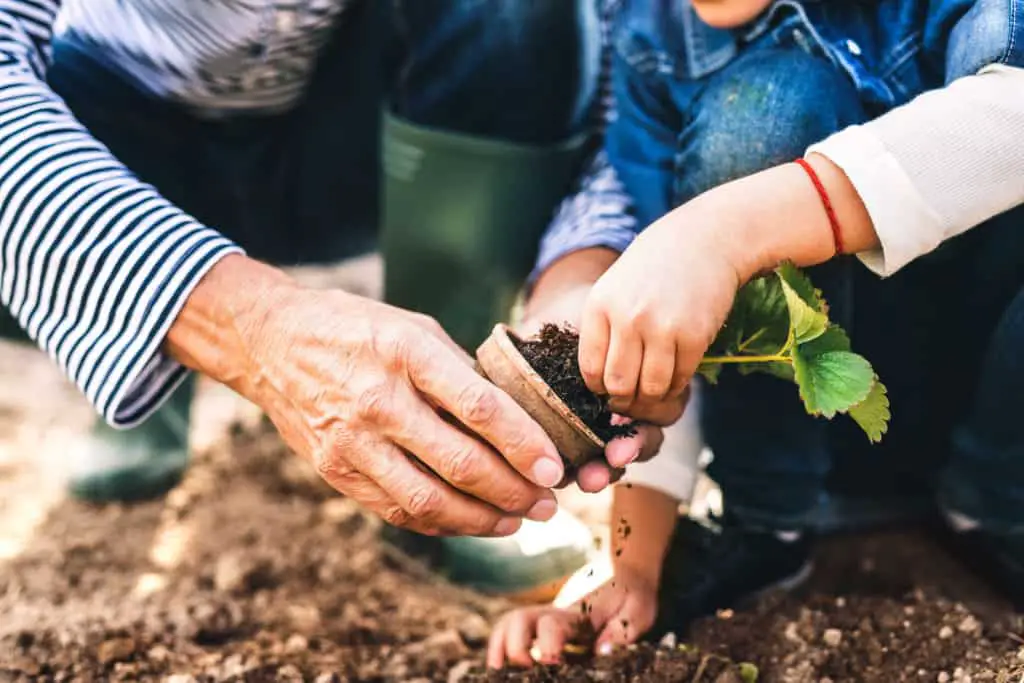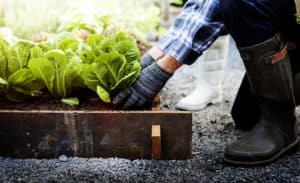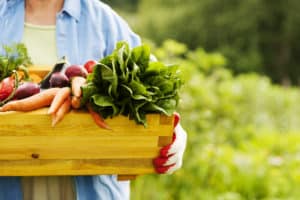
The gardening and longevity connection, is it real? Well, consider this. In parts of Japan, Greece, Sardinia and Costa Rica, it’s common for people to live into their 90s and even their 100s. These “centenarian centers” feature a mostly plant-based diet, moderate exercise regime, and a strong social support system. And there’s one other thing: the residents garden, and they don’t stop as they get up in years.
Gardening As Physical Exercise for Seniors
Gardening is good for everyone by helping to maintain strength, flexibility and cardiovascular fitness. That’s particularly important for seniors, who tend to lose strength and flexibility as they age unless they make a conscious effort to preserve it.
Digging holes in the ground, pulling out stones and aggressively weeding takes effort. Reaching, stretching and bending engage muscle groups that some people tend to ignore. And we know that the more you move, the easier it is to keep moving.
Different gardening activities require different levels of exertion, but it’s estimated that gardening burns 200 to 300 calories per hour. That’s the same as walking at an easy-to-moderate pace. You could burn those calories in a gym, of course, but most people find gardening more satisfying, and there aren’t any monthly fees.
Tennis and golf are good exercises as well, but they carry more risk of injury. Also, it’s easier to garden when you’re just a little tired or sore than it is to chase a tennis ball around a court.
Also, gardening is a commitment. You might not stick with a gym program, but once you start a garden, you make an implied promise to the plants you’re raising. You have to keep tending them if you want your garden to be beautiful and productive.
Seniors who garden decrease their risk of high blood pressure, obesity, heart disease, stroke and type 2 diabetes. These are some practical reasons for the connection between gardening and longevity.
Gardening and Physiology
The health benefits of gardening for seniors go beyond building muscles and strengthening the heart and lungs. Moderate exercise, the type that gardening offers, increases the production of serotonin and dopamine. These are the hormones that make you feel happy, as if you’re “in the zone” when you’re working at a challenging but not overly strenuous pace. Exercise also reduces cortisol, the stress hormone.
In addition, exposure to the sun (while using sunscreen, of course) boosts vitamin D levels. That vitamin regulates mood, helps calcium absorption for bone strength and protects the immune system.
It isn’t just the exercise that encourages the dopamine response. Even looking at flowers, smelling fruit or picking a berry can have the same effect. Our positive reaction to plants is part of who we are as human beings.
There’s an added bonus in that dirt is good for you! There’s a bacterium in the soil called Mycobacterium vaccae, that triggers serotonin release. Many experts believe that modern society, with its emphasis on super-hygiene, germicides and protective clothing, has deprived us of some natural immunity.
Modern-day children don’t dig in the dirt as much as they could, and most older adults don’t, either. You seniors now have permission to take the gloves off and pick up soil by the fistful!
Engagement with Nature
For thousands of years, people lived mostly outside, and it was good for us. In some parts of the world, walking in the woods and fields is prescribed for high blood pressure and anxiety. We weren’t built to be disconnected from the natural world.
You don’t even have to be out and about. Some studies indicate that patients in hospitals recover faster if their window looks out onto a natural vista rather than facing a brick wall. Even viewing pictures of outdoor scenes makes people feel better.
Perhaps serotonin and dopamine are mechanisms that improve our moods, but we don’t have to think about hormones to know that the great outdoors is good for us. We can just appreciate the magic of making something grow and enjoy the result. Gardening is all about creation and renewal.
Mental Engagement 
Gardening not only releases chemicals that lower stress and improve your mood. It also keeps you mentally active. It makes you think. Keeping the brain engaged is an excellent tool to avoid dementia.
In any garden plot, there are always problems to be solved. Mother Nature works with us, but not always in the way we expect. You may go out to your garden intending to do some routine weeding but find that something is amiss with your tomatoes. You now have to figure out what caused the issue. Is it a fungus? Was it a varmint? What’s the best course of action? There are books and online resources that can help, but you have to do the research and make the conclusions.
Gardening keeps you in the moment: all senses engaged: sight, hearing, touch, smell, and even taste if you help yourself to a bite of something while you’re working.
The creative aspect of gardening bodes well for seniors as well. Gardening is hobbying with purpose. Scientists note that having a sense of purpose is one attribute that can prolong longevity. We nurture ourselves when we nurture something outside of ourselves. There’s a tremendous sense of satisfaction in looking out over a garden that you yourself planned and created.
Finally, it keeps us humble and teaches us patience. Not everything we plant is going to flourish. We learn to accept that while some things are within our control, others are not, similar to all things in life.
Social Engagement
Much of gardening is a solitary activity, but it’s not the sort of solitary work that isolates. When you become a gardener, you connect to everyone who has ever stuck a spade in the dirt. It’s natural to strike up conversations with neighbors who also garden. There are trips to the garden center, where there’s always something to learn from the staff or from other customers.
Many seniors join clubs or do their work in community gardens. There are seminars, lectures and learning opportunities. Gardening is a pastime that can be passed downk to grandchildren and other younger people.
Improved Diet 
Gardeners who grow vegetables get to eat them. We’ve observed already that long-lived societies are often those with a largely plant-based diet, and there’s no better incentive to eat plants than having fresh ones available.
The fruits and vegetables you grow will usually be more nutritious than the ones you buy at the store. Fruits and vegetables can lose up to 30 percent of their nutrients within three days of being picked. Fresher foodstuffs not only taste better. They are better nutritionally.
Also, a lot of seniors consider frugality to be a virtue. Store-bought tomatoes are expensive, but one lovingly nurtured tomato plant produces a lot of tomatoes. If you can’t eat them all by yourself, they make great gifts for friends and neighbors.
Making Gardening Easier for Seniors
No matter how diligent you are about fitness and exercise, sooner or later you reach an age where physical activity is harder. Gardening may become more challenging, but that’s no reason to stop.
If bending becomes difficult, there are options. Raised beds are a great gardening alternative. Vertical planting on trellises or walls is another possibility. Some plants, such as small peppers and herbs, can be grown in pots on tabletops.
The right tools are especially important for older folks. The best ones are long-handled or curved and have outstanding grips.
Some light stretching before and after gardening will help to alleviate stiffness. Also, in the heat of the summer, it’s a good idea to work early in the day or in the cool of the evening.
Another helpful hint is to find a gardening buddy. If two seniors work together, they can split the more difficult tasks, and a senior with a younger plant pal can delegate most or all of the rigorous work.
Will Gardening Extend Your Life?
While evidence is compelling that gardening increases life expectancy, there’s no guarantee it will make any specific person live longer. Most people define life expectancy as the number of years you can expect to live. However, a wise writer once redefined it as the amount of life you expect to get out of every day.
Gardening provides seniors with exercise, relieves their stress, keeps them mentally and socially engaged and, yes, allows them to expect more life out of each day. All of these are factors tend to make people not only live longer but also enjoy better health in the years that they do have. It’s no wonder gardening is sometimes called “horticultural therapy.”
